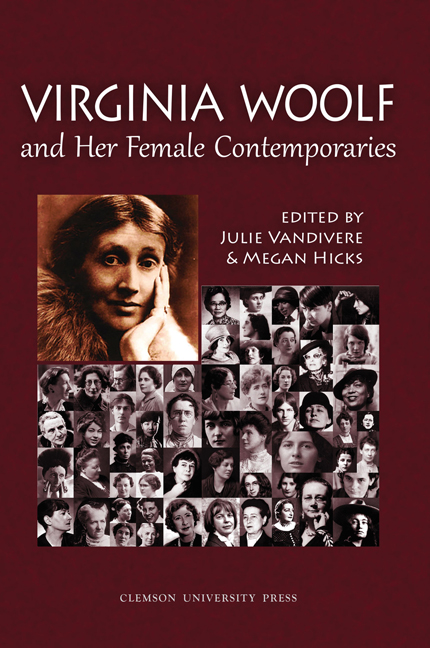Book contents
- Frontmatter
- Table of Contents
- Introduction
- Acknowledgments
- Abbreviations
- Who Are Virginia Woolf's Female Contemporaries?
- Virginia Woolf's Cultural Contexts
- Virginia Woolf's Contemporaries Abroad
- Reconfiguring the Mermaid: HD, Virginia Woolf, and the Radical Ethics of Writing as Marine Practice
- A Carnival of the Grotesque: Feminine Imperial Flânerie in Virginia Woolf 's “Street Haunting” and Una Marson's “Little Brown Girl”
- Mad Women: Dance, Female Sexuality, and Surveillance in the Work of Virginia Woolf and Emily Holmes Coleman
- Shop My Closet: Virginia Woolf, Marianne Moore, and Fashion Contemporaries
- Virginia Woolf and Victoria Ocampo: A Brazilian Perspective
- Making Waves in Lonely Parallel: Evelyn Scott and Virginia Woolf
- Critical Characters in Search of an Author: Cornelia Sorabji and Virginia Woolf
- “In my mind I saw my mother”: Virginia Woolf, Zitkala-Ša, and Autobiography
- Virginia Woolf's Contemporaries at Home
- Tribute to Jane Marcus
- Notes on Contributors
- Conference Program 223
Mad Women: Dance, Female Sexuality, and Surveillance in the Work of Virginia Woolf and Emily Holmes Coleman
from Virginia Woolf's Contemporaries Abroad
- Frontmatter
- Table of Contents
- Introduction
- Acknowledgments
- Abbreviations
- Who Are Virginia Woolf's Female Contemporaries?
- Virginia Woolf's Cultural Contexts
- Virginia Woolf's Contemporaries Abroad
- Reconfiguring the Mermaid: HD, Virginia Woolf, and the Radical Ethics of Writing as Marine Practice
- A Carnival of the Grotesque: Feminine Imperial Flânerie in Virginia Woolf 's “Street Haunting” and Una Marson's “Little Brown Girl”
- Mad Women: Dance, Female Sexuality, and Surveillance in the Work of Virginia Woolf and Emily Holmes Coleman
- Shop My Closet: Virginia Woolf, Marianne Moore, and Fashion Contemporaries
- Virginia Woolf and Victoria Ocampo: A Brazilian Perspective
- Making Waves in Lonely Parallel: Evelyn Scott and Virginia Woolf
- Critical Characters in Search of an Author: Cornelia Sorabji and Virginia Woolf
- “In my mind I saw my mother”: Virginia Woolf, Zitkala-Ša, and Autobiography
- Virginia Woolf's Contemporaries at Home
- Tribute to Jane Marcus
- Notes on Contributors
- Conference Program 223
Summary
Published in the 1927 issue of Eugene Jolas's avant-garde journal transition, Emily Holmes Coleman's poem, “The Liberator,” reads like a modern woman's call to arms. Planning her escape from an asylum that could just as easily be read as a prison and preparing her female compatriots for an act of rebellion, the speaker rises like a phoenix from its ashes—“I am powerful now.” The poem closes with the image of women dancing the ecstasy of their release:
and we shall wave high the keys
and open wide a million doors
and all of us shall dance in the snow…
all of us
shall
dance
within
Modernist in its cinematic presentation of fragmented bodies and space, surrealist in its syntactically correct but semantically unusual verbal combinations, its obscure referents, and its hallucinatory sense of reality—beds stare, eyes leap—“The Liberator” can be read as anticipating the aesthetic-political issues circulating in Coleman's only published novel, The Shutter of Snow, which she began writing in 1927 and finished in 1929. After being rejected by several publishers, including the Woolfs’ Hogarth Press, The Shutter of Snow was finally accepted for publication by Routledge and appeared both in America and England in 1930.
Coleman's image of women dancing in the snow, one that haunts her novel as well, anticipates the exuberant dance choreographed by Virginia Woolf towards the end of her feminist political manifesto, Three Guineas (1938). There, you may recall, as she proffers her second guinea, Woolf cries: “And let the daughters of uneducated women dance round the new house, the poor house…and let them sing, ‘We have done with war! We have done with tyranny!’…Light up the windows of the new house, daughters! Let them blaze” (100). Armed with indignation, petrol, matches, and four teachers—poverty, chastity, derision, and freedom—from whom she says they must refuse to separate, Woolf 's dancing daughters perform a revolutionary counterpoint to what she refers to as that other “ring, the vicious circle, the dance round and round the mulberry tree, the poison tree of intellectual harlotry” (117). As Three Guineas so powerfully details, this “vicious circle,” the dance round and round of patriarchy, militancy, and nationalism, conjures only the deadly tyranny of the same.
- Type
- Chapter
- Information
- Virginia Woolf and Her Female Contemporaries , pp. 109 - 115Publisher: Liverpool University PressPrint publication year: 2016



